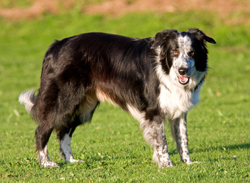Border Collies are medium-sized dogs with muscular bodies. Their double coat is dense, close fitting, and weather-resistant, and it can be smooth or rough. The top coat is wavy or straight, while the undercoat is soft, short, and dense. These dogs come in any coloration, including solid, bi-color, tri-color, sable, and merle patterns. Their eyes are oval and set well apart, and their muzzles are strong. They measure 18 to 22 inches tall at the shoulder and weigh 30 to 45 pounds. With quality care, these dogs can live up to 15 years.
These dogs tend to try to boss animals and people around, including their human family members. They are very territorial and tend to bark a lot, traits that make them good watchdogs.
This is an extremely active and energetic breed, and these dogs need a lot of activity and space to run. Border Collies are not suitable for sedentary families. They do best on farms or in areas where they can freely run and roam, and they are great with children of all ages.
Border Collies are highly intelligent and possess superior instinct. They are arguably the best sheep-herding dogs in the world.
A responsive, alert, playful, and affectionate breed, Border Collies are great family dogs. They are good with older, well-behaved children, but they will try to herd them if given the chance. They are loving with family members, but reserved with strangers. However, they are never fearful or aggressive. Because these dogs can be demanding, they might not be an ideal choice for people looking for an easy dog that requires little time or attention. They get along well with other dogs, but they aren't great with cats. In fact, they often drive kitty siblings crazy by checking on them constantly and pushing them around the house.
Border Collies are competitive, determined, and focused, and they need a lot of activity and stimulation. They are ideal for people who work and play outdoors, and they do best with a big backyard or on a farm.
Some Border Collies may develop compulsive behavior, such as chasing shadows, waiting for the dishwasher to finish before leaving the kitchen, or twirling in circles. While these behaviors may seem cute, they are true compulsions and should not be encouraged. Stress and boredom can make these behaviors worse.
Border Collies are at risk for a number of potentially serious conditions. Hip dysplasia, epilepsy, deafness, hypothyroidism, and primary ciliary dyskinesia are all known to affect this breed. Primary ciliary dyskinesia is an inherited respiratory disorder that causes sneezing, coughing, and frequent respiratory infections.
This breed is also more prone than other dogs to suffer from Collie Eye Anomaly, a congenital eye disease that may cause blindness. Fortunately, there's a genetic test for this disease. Progressive retinal atrophy and two fatal conditions, called neuronal ceroid lipofuscinosis and trapped neutrophil syndrome, are also seen in Border Collies. Lens luxation, cerebellar abiotrophy, and ceroid lipofuscinosis are other concerns when adopting or purchasing this breed.
With genetic screenings, routine veterinary care, regular exercise, and good nutrition, Border Collies can live up to 15 years.
Border Collies are highly trainable, very intelligent, and have superior reasoning abilities. They benefit from obedience lessons and actually like firm and friendly training. They also appreciate direction. Harsh punishment elicits irrational reactions, and this breed should be trained carefully in order to ensure success.
These dogs tend to try to boss animals and people around, including their human family members. They are very territorial and tend to bark a lot, traits that make them good watchdogs. They are happiest and do best when given a job to perform. These dogs must be kept mentally and physically stimulated, as they tend to act out when bored and lonely and may become destructive. When ignored, they promptly begin digging, chewing, and barking. They can be kept busy with work or dog sports, such as flyball, agility, obedience, tracking, and herding.
Border Collies are family dogs and need to spend time with their humans. If left alone for long periods, these dogs become destructive. Additionally, they may develop phobias to noise, such as thunderstorms and fireworks. Phobic symptoms increase during stressful periods.
These dogs are available in two types of double coat. One is short and smooth with feathering on the front legs. The other is rough and medium to long with slightly wavy hair. Both coats need brushing once or twice each week to remove dead hair and distribute skin oils.
Border Collies only need bathing when their coat becomes sticky or soiled with a dangerous substance. Some of these dogs enjoy baths, though, and these can be washed more frequently with a canine shampoo. The ears should be checked for infection and cleaned as needed.
Border Collies often wear their nails down because they are so active. Still, the nails should be checked weekly and clipped, if necessary. The teeth need frequent brushing to prevent gum disease and cavities.
Border Collies hail from the border area between England and Scotland. They probably developed from mixing Spaniels and droving breeds, and they were bred to work long periods on rugged terrain. These dogs were prized for allowing shepherds to keep large flocks of sheep, and were excellent at working on their own, away from their master.
The breed as we know it today has been around 100 or more years. In the late 19th century, Queen Victoria fell in love with the Border Collie breed, and it was at this point that today's Collie and the classic Border Collie started to diverge.
Border Collies are intense and intelligent dogs able to control herds with a gaze known as "the eye" and a stalking motion. These dogs are considered the premier sheep herding dogs in the world, and they are still used for this purpose in many countries. They are also excellent at detecting drugs and bombs.
The American Kennel Club officially recognized the Border Collie in 1995.

